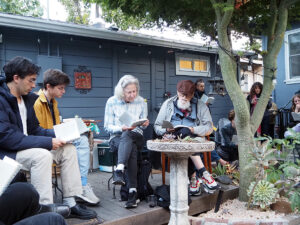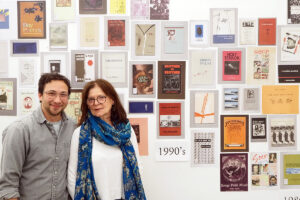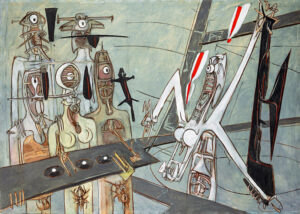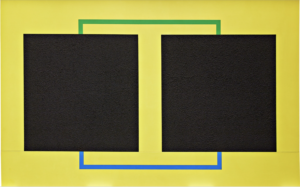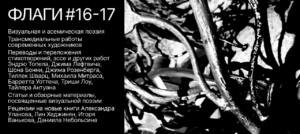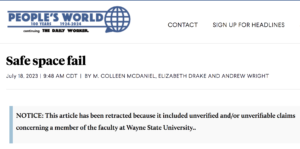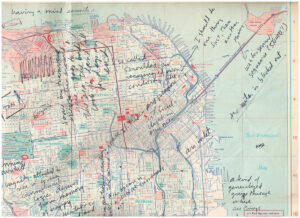The photo registers the scene: it is Ron Silliman reading, Krishna Evans following the text. Or perhaps Krishna is reading and Ron is following the text, as will be the case in a minute or two, as soon as Ron finishes his passage. The vantage point is from where I am sitting, having read my part some time ago and now listening as it continues. To the side are Eliot D’Silva next to Ivan Sokolov; then to the right are Jen Hofer, leaning against the garage; Claire Marie Stancek is just behind the forked trunk of a tree; Jennifer Scappettone between the branches of the tree, and Jane Gregory, the host of the event, is to the far right. Continuing out of the picture one would encounter Lytle Shaw, whose elbow is just visible, and then next Syd Staiti on the stairs. Everyone is not especially solemn but bent to the task, reading Lyn Hejinian’s just published Fall Creek (Litmus Press), copies and xeroxes of which are out on the table. All of them have taken their turn. There are thirty-three sections, with Ron and Krishna reading the next-to-final two, before the group takes up the last section in unison. This was my proposal to the group at the break, recalling the pleasure of cacophony in our Grand Piano reading of “A”–24, whose plurivocality Lyn internalized and, some decades later, realized in one of her last works. … More
>> Documents <<
June 8, 2024
Entry 59: The Indexical Present I
Friday, May 17
Delta 361 DTW > SFO
The Lab
Small Press Traffic
Hal Foster, Unseen
@ Et al. Gallery
May 17 is a triangular nexus in my calendar: birthdays of Lyn Hejinian, Kit Robinson, and Kathleen Frumkin, often celebrated with light remarks about page turning and celestial inevitability. Now that has changed, while the date remains as an index. On that date, Carla Harryman and I determined to travel west, to reconnect and make new connections, prompted by Lyn’s passing but multi-tasking as usual. File under “persons”: “Leaving tomorrow AM for one-week tour of the West Coast (San Francisco, Alameda, Berkeley, San Diego), focusing on people, the best kind of travel,” I wrote on Facebook. But “persons” are an index as well, to their activity and the contexts that surround them. Thus we encounter them.
Andrew Smith, for instance, was a person not known to me—but it was a fine meeting. In his role as director of The Lab, he is the custodian, as it were, of its history as well as current reinventor of its mission. Space and time: The Lab was founded, I read, 39 years ago, which I know as one of my first promising students, Laura Brun, was its cofounder. At the time I was teaching—I think for three semesters, but it may have been two—for the Center for Experimental and Interdisciplinary Arts at San Francisco State. My credentials were minimal: emergent poet and editor making an uproar on the San Francisco scene, represented by readings and publications—reputational capital enough for contingent appointment, though it would not last (I remember the day I turned in my keys and ID after my appointment was not renewed). Nor would the program itself. But its success, and mine, was the students, memorably Laura—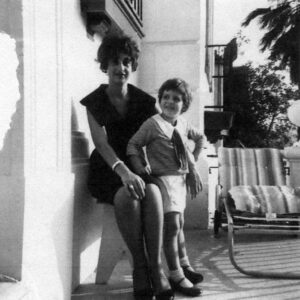 while a number are visible on social media and are doing things in the arts. Laura was dedicated to the cause, and she put in her time getting The Lab up and running at a storefront on Divisidero Street. Among the start-up arts spaces from the 70s and 80s—Capp Street, 80 Langton Street, Project Artaud, ATA—The Lab is one of the survivors, along with Small Press Traffic; many others have gone down. And Laura, too. … More
while a number are visible on social media and are doing things in the arts. Laura was dedicated to the cause, and she put in her time getting The Lab up and running at a storefront on Divisidero Street. Among the start-up arts spaces from the 70s and 80s—Capp Street, 80 Langton Street, Project Artaud, ATA—The Lab is one of the survivors, along with Small Press Traffic; many others have gone down. And Laura, too. … More
May 5, 2024
Entry 58: Smithson and the Turn to Poetics
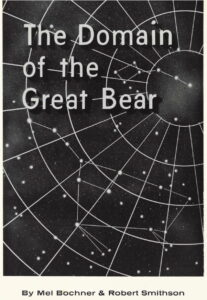 In a postscript to her major biocritical reassessment of Robert Smithson and his oeuvre (Inside the Spiral: The Passions of Robert Smithson), Suzaan Boettger recalls the arrival by mail of the just-published collection of The Writings of Robert Smithson (1979), edited by Nancy Holt and designed by Sol LeWitt. This watershed publication—at the boundary of literature and art, production and reception, content and design—truly launched Smithson into the “Domain of the Great Bear,” his art-historical destiny in the starry night. She sees it as a biographical convergence, writing in her copy:
In a postscript to her major biocritical reassessment of Robert Smithson and his oeuvre (Inside the Spiral: The Passions of Robert Smithson), Suzaan Boettger recalls the arrival by mail of the just-published collection of The Writings of Robert Smithson (1979), edited by Nancy Holt and designed by Sol LeWitt. This watershed publication—at the boundary of literature and art, production and reception, content and design—truly launched Smithson into the “Domain of the Great Bear,” his art-historical destiny in the starry night. She sees it as a biographical convergence, writing in her copy:
“This book arrived in the mail on my birthday, 1979, as I was on my way to deliver my first lecture—on earthworks.” While I had prepared by reading Smithson’s texts published in periodicals, the collection’s appearance on the day of my lecture seemed nothing less than serendipitous. (339)
February 11, 2024
Document 102: Note on Conduit
“Conduit” (“Kanal svyazi”)
trans. Arkadii Dragomoshchenko and Vladimir Feshchenko
Vsealizm (Moscow), 11 February 2024
From Moscow, for the second week in a row, comes a new translation of my work into Russian—here, “Conduit” into “Kanal svyazi”—in preparation for a bilingual edition to appear, one hopes, later this year. This work, brought forward over decades and across continents, truly stands as a conduit in the distressed conditions of communication, between the “territories of the East” and the rest of the world assuredly, but more generally as “what we live.” As I wrote on receiving word of this wonder:
There was a line from a Poets Theater play, Third Man by Carla Harryman, early 80s, spoken by Eileen Corder: “Go ahead, Moscow—I’m listening!” That was transgressive in the Reagan Era; in the current moment, one listens carefully to say the least. And now this translation of my poem “Conduit” has appeared—it is all about receiving messages, and not letting them stand as commonplaces or placeholders but as samples of “systematic distortion.” It’s about the “systematic distortion” of communication as communication itself, which we experience every day.
January 27, 2024
Document 101: Loyal to Many Flags
And loveliness?
Death has an understanding of it
Loyal to many flags
And is a silent ally of any country
Beset in its mortal heart
With immortal poetry.
—Laura Riding, “The Poet’s Corner
From Moscow, under conditions of global duress, comes the online publication of Flagii (Flags), double issue, numbers 16/17. Clicking on this link gets the issue, and for those without Russian, using Google translate or its equivalent yields a sense of the incredible poetic activity going on right now, with an intent to find “allies of any country.” Also breaching the gap are a number of texts with visual properties, in a selection introduced by Vladimir Feshchenko with work by Jackson Mac Low, Bernadette Mayer, Larry Eigner, Robert Grenier, Hannah Weiner, Rachel Blau du Plessis, Susan Howe, and myself (“Introduction to the Letter T”). I am also represented by an interview with Vladimir Koshelev and a translation of a section of Under Erasure by Lisa Kheresh, linked here, as well as the note on a little-known collage by Sylvia Plath that I wrote about on this site in 2010 (here), with commentary in Russian (here). It is not only a real honor to be included in this work but an example of what we should be doing now, connecting across the greatest distances possible, aspiring toward the horizon of “this time we are both.” … More
January 21, 2024
Entry 57: Am I That Name?
COMPLETE RETRACTION!
I write this entry at a moment of reflection, ten years after being asked to write a series of weekly articles as guest poet/critic for the online journal Jacket2. This was offered and accepted in good faith; I would gladly accept such a task in a minute, any time. Somewhat at a loss for where to begin, I took up the question of “presentism” in relation to the state of the present that was most compelling at the moment—a grim January freeze in Detroit, with its attendant affective states. This was ironic, as the distinction between presentism and historicism I was engaged in thinking through was propelling me toward the essays collected in Questions of Poetics—for some of my use of the term, click here. Let’s say the “presentism” at the moment was history at a standstill, wondering which way it would go—and what the consequences would be. Those consequences, it turned out, were immediate—a three-ring circus of attacks by designated officers of the poetic Left. Here, I am not naming names—but the triumvirate was ready and took the opportunity to stage a bloody attack on my public stance in the discourse of poetics. … More
January 5, 2024
Entry 56: A Poetics of Encounter
A Poetics of Encounter:
Dialectic of Outside with the Beats
Read at “Can We Teach the Beat Generation?”
Discussion organized by Erik Mortenson and Tony Triglio
Session 228, 5 January 2024, 10:15–11:30 AM, Loews 3rd Fl.
Modern Language Association, Philadelphia“The transmission of poetry is a passion unlike any other.”
“I too have started a riot in the academy.”
In this note, I want to call up certain moments of encounter that were, as with the visual image of a “diamond thunderbolt” or dorje, immediate, double-faced, and bivalent: outward in the transmission of poetry, from the Beats or New Americans and others; and inward, toward self-formation and a long process of professionalizing within the Academy. In charting such a poetics of encounter, I draw from my presentations at the “decades” poetry conferences at University of Maine, Orono, in the 90s and 00s that I, in the company of a shifting assemblage of poet/critics, took part in. I connect these moments to Steven Belletto’s genealogy of three early moments of encounter between Beats and the Academy: Jack Kerouac’s intervention at a symposium sponsored by Brandeis University in New York, 1958; Diana Trilling’s reaction to Allen Ginsberg’s being given an “unofficial” reading at Columbia, that same year; and Gregory Corso’s rebuttal to a symposium on the Beats in Wagner Literary Review, 1959. These are part of series of breakthrough moments: the Gallery 6 reading, San Francisco, 1955; Ginsberg’s appearance in Time magazine, 1959; the Vancouver Poetry Conference, 1963; the Berkeley Poetry Conference, 1965. What makes the first three definitively “Beat” aligns with two concepts from my essay on Michael McClure: antagonism and holism. In challenging the Academy’s scholastic pedagogy—I often thought of the English Department in the 60s or 70s as a kind of monastery, corridors filled with the brethren nodding to each other under hooded robes—the Beats took a position Outside that was, at the same time, subject to everything—“Is there a world?,” Kerouac asked; “Man does not exist,” opined Corso. The nature of this encounter between an unregulated Outside and a self-regulating Inside points to a dialectic of the Academy whose stakes are not only literary, pointing toward our volume’s significance not only for Literary but University Studies. … More
December 31, 2023
Entry 55: Beginning Again and Again
Scaffolding Repetition: Gertrude Stein,
Language Writing, Electronic Dance Music (online here)
eLyra 22, special issue on “Poetics and Politics
of Repetition,” ed. Bruno Ministro, 25 December 2023 (online here)
Abstract: This essay takes up the critique of repetition in Gertrude Stein, her claim to have written a “continuous present” that “begins again and again” and “includes everything” versus her later qualification that repetition is always shifting in terms of “insistence” and “emphasis”. Even so, Stein focuses on the unfolding of the verbal material primarily in a linear fashion, though resonances and overtones abound. In Electronic Dance Music, from Detroit to Berlin techno, one finds more vertical layerings and “scaffolding”—a term taken from Soviet psychologist Lev Vygotsky—as a way of building up sonic elements in pleasurable and meaning-bearing ways. Using these two contrasting models of repetition, I read three language-centered poets—Ron Silliman, Leslie Scalapino, and Marjorie Welish—in terms of their complex forms of temporality in poetic form, seen in terms of Stein’s often repeated framework of “beginnings, middles, and ends”. I conclude with a discussion of ”vital movement” in the electronic dance music of Berlin DJ Ellen Allien.
Keywords: Modernism, avant-garde, repetition, language writing, poetry, electronic music, American, Berlin
November 14, 2023
Entry 54: The Transmission of Poetry
MATERIAL TRANSMISSIONS:
DEMOTIC SURREALISM/HIERATIC LANGUAGE,
SAN FRANCISCO, 1975–1980
Plunged each day into the fog of received ideas, man is led to conceive
of all things and to conceive of himself through a dizzy series of quickly
hidden stumblings, of false steps rectified as best as possible.
—André Breton, “The Automatic Message” (1933)
